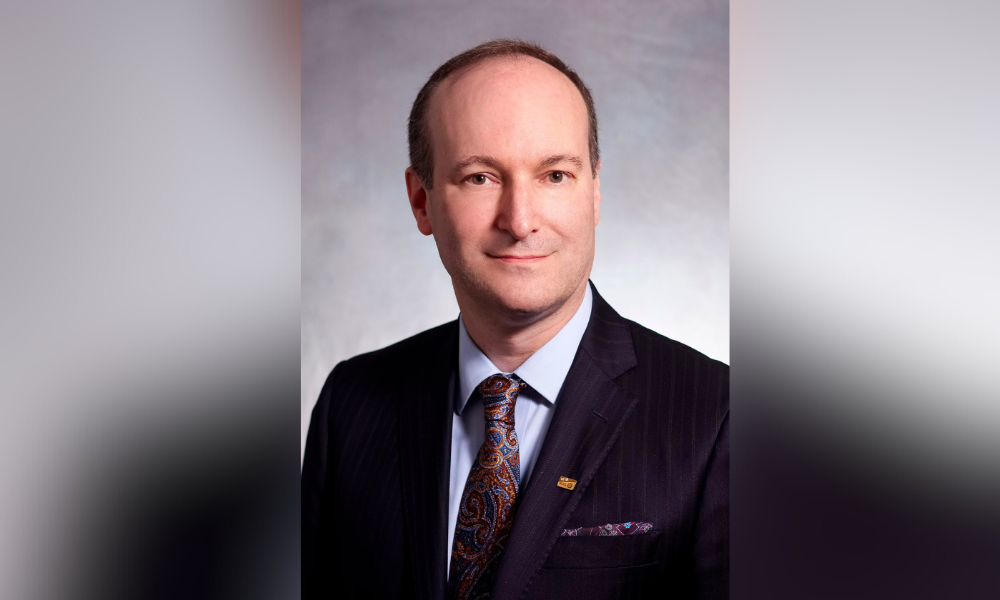Economist weighs up the prospect of a soft landing – or a sharp downturn

The national economy has held up “remarkably well” in the face of Bank of Canada rate hikes since last year – but Wednesday’s increase also means a higher risk of pain for many borrowers, according to BMO’s chief economist.
Doug Porter (pictured) told Canadian Mortgage Professional that there were two sides to the question of whether further stress was likely to arise in the mortgage market as a result of the latest hike, with robust economic performance in 2023 to date weighing against the likely impact of even higher rates.
“Part of the reason why rates have started to go up again is because the economy has managed the initial volley of interest rates so well,” he said. “We haven’t seen that much stress, we certainly haven’t seen forced selling in the real estate market, we haven’t seen that many strains in the mortgage market.
“It’s part of the reason why the Bank has started raising rates again, because the overall system has held up remarkably well. The other side of the coin: now the Bank has raised interest rates even further. So it does increase the risk of some pain.”
The central bank’s latest move took its policy rate to 5.0%, marking a full 475-point shift since May of last year, in a decision that will see borrowing costs rise yet again for millions of Canadians.
The economy’s resilient performance in the year to date bodes well for the prospect of avoiding a recession, although the risk of a sharp downturn has not vanished, according to Porter.
“I tend to believe that when we balance these things out, the chances of a soft landing have actually increased because the economy has held up,” he said. “People have managed to deal with things so far, and inflation is coming down.
“But the risks of a hard landing have not gone away, and of course the higher the Bank takes interest rates, the longer they stay at these high levels, the greater the risk to the economy.”
Governor Tiff Macklem: “We’ve come a long way, and we don’t want to squander the progress we’ve made. We need to stay the course to restore price stability for Canadians.”https://t.co/zyuRcYxFbd#cdnecon pic.twitter.com/HrXILs6z4b
— Bank of Canada (@bankofcanada) July 12, 2023
Will the Bank of Canada raise rates again in 2023?
The decidedly hawkish tone of the Bank’s statement surprised some observers, particularly as Governor Tiff Macklem indicated in a post-announcement press conference on Wednesday that the decision to hike was by no means a clear-cut one.
There had been some uncertainty over whether the Bank would hike, Porter noted, with markets only around three-quarters priced for it – but the central bank also didn’t completely close the door on further rate hikes down the line.
That said, BMO expects Wednesday’s move to be the last rate bump of 2023. “[The Bank] definitely sounds concerned, still about underlying inflation,” Porter said. “But having said all that, reading between the lines, our view is that they probably think they’ve done enough. Of course, we’ll have to see how inflation does in the months ahead and how well the economy holds up.
“But our view is, this is probably enough to bring down inflation further, and it’s enough to act as a real restraint on the economy. So we suspect that this will be the last hike of the year.”
Why did the Bank give little indication of where rates are headed?
The central bank had hit pause on rate hikes in its March and April announcements, using somewhat dovish language to suggest that it would be prepared to keep rates where they were for the foreseeable future if economic indicators continued to play out as expected.
Porter said it may have learned from that mistake, having returned to rate hikes in June after inflation and the labour market’s performance proved stronger than envisaged.
“Our view is that the Bank was a little too clear-cut in their pause language earlier this year, and I think it helped fire up the housing market,” he said. “They’re not going to make that mistake again.
“So that’s why there was no mention of pause [in its latest statement]. They certainly don’t want to promise something they can’t keep to, but the reality is they’re not sure if they need to hike interest rates further or not.
“They have to see how the economy handles the big rate increase in the last 15 months. They have to see what inflation does. And they probably shouldn’t be promising something, or even have promised something, that they can’t deliver on. So I think that’s why they were very careful not to talk about this possibility.”



